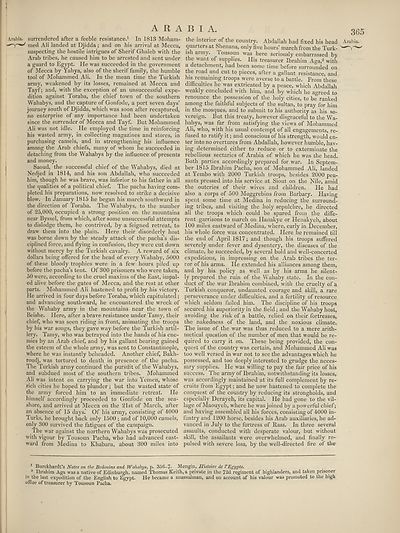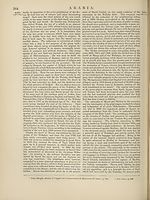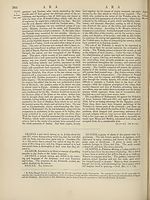Encyclopaedia Britannica > Volume 3, Anatomy-Astronomy
(373) Page 365
Download files
Complete book:
Individual page:
Thumbnail gallery: Grid view | List view

A II A
Arabia, surrendered after a feeble resistance.1 In 1813 Moham-
med Ali landed at Djidda; and on his arrival at Mecca,
suspecting the hostile intrigues of Sherif Ghaleb with the
Arab tribes, he caused him to be arrested and sent under
a guard to Egypt. He was succeeded in the government
of Mecca by Yahya, also of the sherif family, the humble
tool of Mohammed Ali. In the mean time the Turkish
army, weakened by its losses, remained at Mecca and
Tayf; and, with the exception of an unsuccessful expe¬
dition against Toraba, the chief town of the southern
Wahabys, and the capture of Gonfode, a port seven days’
journey south of Djidda, which was soon after recaptured,
no enterprise of any importance had been undertaken
since the surrender of Mecca and Tayf. But Mohammed
Ali was not idle. He employed the time in reinforcing
his wasted army, in collecting magazines and stores, in
purchasing camels, and in strengthening his influence
among the Arab chiefs, many of whom he succeeded in
detaching from the Wahabys by the influence of presents
and money.
Saoud, the successful chief of the Wahabys, died at
Nedjed in 1814, and his son Abdallah, who succeeded
him, though he was brave, was inferior to his father in all
the qualities of a political chief. The pacha having com¬
pleted his preparations, now resolved to strike a decisive
blow. In January 1815 he began his march southward in
the direction of Toraba. The Wahabys, to the number
of 25,000, occupied a strong position on the mountains
near Byssel, from which, after some unsuccessful attempts
to dislodge them, he contrived, by a feigned retreat, to
draw them into the plain. Here their disorderly host
was borne down by the steady attack of the pacha’s dis¬
ciplined force, and flying in confusion, they were cut down
without mercy by the Turkish cavalry. A reward of six
dollars being offered for the head of every Wahaby, 5000
of these bloody trophies were in a few hours piled up
before the pacha’s tent. Of 300 prisoners who were taken,
50 were, according to the cruel maxims of the East, impal¬
ed alive before the gates of Mecca, and the rest at other
parts. Mohammed Ali hastened to profit by his victory.
He arrived in four days before Toraba, which capitulated;
and advancing southward, he encountered the wreck of
the Wahaby army in the mountains near the town of
Beishe. Here, after a brave resistance under Tamy, their
chief, who was seen riding in front, animating the troops
hy his war songs, they gave way before the Turkish artil¬
lery. Tamy, who was betrayed into the hands of his ene¬
mies by an Arab chief, and by his gallant bearing gained
the esteem of the whole army, was sent to Constantinople,
where he was instantly beheaded. Another chief, Bakh-
roudj, was tortured to death in presence of the pacha.
The Turkish army continued the pursuit of the Wahabys,
and subdued most of the southern tribes. Mohammed
Ali was intent on carrying the war into Yemen, whose
rich cities he hoped to plunder ; but the wasted state of
the army forced him to an immediate retreat. He
himself accordingly proceeded to Gonfode on the sea¬
shore, and arrived at Mecca on the 21st of March, after
an absence of 15 days.’ Of his army, consisting of 4000
Turks, he brought back only 1500 ; and of 10,000 camels,
only 300 survived the fatigues of the campaign.
the war against the northern Wahabys was prosecuted
with vigour by Tousoun Pacha, who had advanced east¬
ward from Medina to Khabara, about 300 miles into
B I A.
the interior of the country. Abdallah had fixed his head
quarters at Shenana, only five hours’ march from the Turk¬
ish army, lousoun was here seriously embarrassed by
the want of supplies. His treasurer Ibrahim Aga,2 witli
a detachment, had been some time before surrounded on
the road and cut to pieces, after a gallant resistance, and
his remaining troops were averse to a battle. From these
difficulties he was extricated by a peace, which Abdallah
weakly concluded with him, and by which he agreed to
renounce the possession of the holy cities, to be ranked
among the faithful subjects of the sultan, to pray for him
in the mosques, and to submit to his authority as his so¬
vereign. But this treaty, however disgraceful to the Wa¬
habys, was far from satisfying the views of Mohammed
Ali, who, with his usual contempt of all engagements, re¬
fused to ratify it; and conscious of his strength, would en¬
ter into no overtures from Abdallah, however humble, hav¬
ing determined either to reduce or to exterminate the
rebellious sectaries of Arabia of which he was the head.
Both parties accordingly prepared for war. In Septem¬
ber 1815 Ibrahim Pacha, son of Mohammed Ali, landed
at Yembo with 2000 Turkish troops, besides 2000 pea¬
sants pressed into his service at Siout on the Nile, amid
the outcries of their wives and children. He had
also a corps of 500 Moggrebins from Barbary. Having
spent some time at Medina in reducing the surround¬
ing tribes, and visiting the holy sepulchre, he directed
all the troops which could be spared from the diffe¬
rent garrisons to march on Hanakye or Henakyeh, about
100 miles eastward of Medina, where, early in December,
his whole force was concentrated. Here he remained till
the end of April 1817; and though his troops suffered
severely under fever and dysentery, the diseases of the
climate, he succeeded, by several bold and well-concerted
expeditions, in impressing on the Arab tribes the ter¬
ror of his arms. He extended his alliances among them,
and by his policy as well as by his arms he silent¬
ly prepared the ruin of the Wahaby state. In the con¬
duct of the war Ibrahim combined, with the cruelty of a
Turkish conqueror, undaunted courage and skill, a rare
perseverance under difficulties, and a fertility of resource
which seldom failed him. The discipline of his troops
secured his superiority in the field; and the Wahaby host,
avoiding the risk of a battle, relied on their fortresses,
the nakedness of the land, and the noxious climate.
The issue of the war was thus reduced to a mere arith¬
metical question of the number of men that would be re¬
quired to carry it on. These being provided, the con¬
quest of the country was certain, and Mohammed Ali was
too well versed in war not to see the advantages which he
possessed, and too deeply interested to grudge the neces¬
sary supplies. He was willing to pay the fair price of his
success. The army of Ibrahim, notwithstanding its losses,
was accordingly maintained at its full complement by re¬
cruits from Egypt; and he now hastened to complete the
conquest of the country by reducing its strongholds, and
especially Derayeh, its capital. He had gone to the vil¬
lage ofMaouyeh, where he was joined by a powerful chief;
and having assembled all his forces, consisting of 4000 in¬
fantry and 1200 horse, besides his Arab auxiliaries, he ad¬
vanced in July to the fortress of Rass. In three several
assaults, conducted with desperate valour, but without
skill, the assailants were overwhelmed, and finally re¬
pulsed with severe loss, by the well-directed fire of the
365
Arabia.
1 Burckhardt’s Notes on the Bedouins and Wahabys, p. 350-7. Mengin, Histoire de VEgypte.
2 Ibrahim Aga was a native of Edinburgh, named Thomas Keith, a private in the T2d regiment of highlanders, and taken prisoner
in the last expedition of the English to Egypt. He became a mussulman, and on account of his valour was promoted to the high
office of treasurer by Tousoun Pacha.
Arabia, surrendered after a feeble resistance.1 In 1813 Moham-
med Ali landed at Djidda; and on his arrival at Mecca,
suspecting the hostile intrigues of Sherif Ghaleb with the
Arab tribes, he caused him to be arrested and sent under
a guard to Egypt. He was succeeded in the government
of Mecca by Yahya, also of the sherif family, the humble
tool of Mohammed Ali. In the mean time the Turkish
army, weakened by its losses, remained at Mecca and
Tayf; and, with the exception of an unsuccessful expe¬
dition against Toraba, the chief town of the southern
Wahabys, and the capture of Gonfode, a port seven days’
journey south of Djidda, which was soon after recaptured,
no enterprise of any importance had been undertaken
since the surrender of Mecca and Tayf. But Mohammed
Ali was not idle. He employed the time in reinforcing
his wasted army, in collecting magazines and stores, in
purchasing camels, and in strengthening his influence
among the Arab chiefs, many of whom he succeeded in
detaching from the Wahabys by the influence of presents
and money.
Saoud, the successful chief of the Wahabys, died at
Nedjed in 1814, and his son Abdallah, who succeeded
him, though he was brave, was inferior to his father in all
the qualities of a political chief. The pacha having com¬
pleted his preparations, now resolved to strike a decisive
blow. In January 1815 he began his march southward in
the direction of Toraba. The Wahabys, to the number
of 25,000, occupied a strong position on the mountains
near Byssel, from which, after some unsuccessful attempts
to dislodge them, he contrived, by a feigned retreat, to
draw them into the plain. Here their disorderly host
was borne down by the steady attack of the pacha’s dis¬
ciplined force, and flying in confusion, they were cut down
without mercy by the Turkish cavalry. A reward of six
dollars being offered for the head of every Wahaby, 5000
of these bloody trophies were in a few hours piled up
before the pacha’s tent. Of 300 prisoners who were taken,
50 were, according to the cruel maxims of the East, impal¬
ed alive before the gates of Mecca, and the rest at other
parts. Mohammed Ali hastened to profit by his victory.
He arrived in four days before Toraba, which capitulated;
and advancing southward, he encountered the wreck of
the Wahaby army in the mountains near the town of
Beishe. Here, after a brave resistance under Tamy, their
chief, who was seen riding in front, animating the troops
hy his war songs, they gave way before the Turkish artil¬
lery. Tamy, who was betrayed into the hands of his ene¬
mies by an Arab chief, and by his gallant bearing gained
the esteem of the whole army, was sent to Constantinople,
where he was instantly beheaded. Another chief, Bakh-
roudj, was tortured to death in presence of the pacha.
The Turkish army continued the pursuit of the Wahabys,
and subdued most of the southern tribes. Mohammed
Ali was intent on carrying the war into Yemen, whose
rich cities he hoped to plunder ; but the wasted state of
the army forced him to an immediate retreat. He
himself accordingly proceeded to Gonfode on the sea¬
shore, and arrived at Mecca on the 21st of March, after
an absence of 15 days.’ Of his army, consisting of 4000
Turks, he brought back only 1500 ; and of 10,000 camels,
only 300 survived the fatigues of the campaign.
the war against the northern Wahabys was prosecuted
with vigour by Tousoun Pacha, who had advanced east¬
ward from Medina to Khabara, about 300 miles into
B I A.
the interior of the country. Abdallah had fixed his head
quarters at Shenana, only five hours’ march from the Turk¬
ish army, lousoun was here seriously embarrassed by
the want of supplies. His treasurer Ibrahim Aga,2 witli
a detachment, had been some time before surrounded on
the road and cut to pieces, after a gallant resistance, and
his remaining troops were averse to a battle. From these
difficulties he was extricated by a peace, which Abdallah
weakly concluded with him, and by which he agreed to
renounce the possession of the holy cities, to be ranked
among the faithful subjects of the sultan, to pray for him
in the mosques, and to submit to his authority as his so¬
vereign. But this treaty, however disgraceful to the Wa¬
habys, was far from satisfying the views of Mohammed
Ali, who, with his usual contempt of all engagements, re¬
fused to ratify it; and conscious of his strength, would en¬
ter into no overtures from Abdallah, however humble, hav¬
ing determined either to reduce or to exterminate the
rebellious sectaries of Arabia of which he was the head.
Both parties accordingly prepared for war. In Septem¬
ber 1815 Ibrahim Pacha, son of Mohammed Ali, landed
at Yembo with 2000 Turkish troops, besides 2000 pea¬
sants pressed into his service at Siout on the Nile, amid
the outcries of their wives and children. He had
also a corps of 500 Moggrebins from Barbary. Having
spent some time at Medina in reducing the surround¬
ing tribes, and visiting the holy sepulchre, he directed
all the troops which could be spared from the diffe¬
rent garrisons to march on Hanakye or Henakyeh, about
100 miles eastward of Medina, where, early in December,
his whole force was concentrated. Here he remained till
the end of April 1817; and though his troops suffered
severely under fever and dysentery, the diseases of the
climate, he succeeded, by several bold and well-concerted
expeditions, in impressing on the Arab tribes the ter¬
ror of his arms. He extended his alliances among them,
and by his policy as well as by his arms he silent¬
ly prepared the ruin of the Wahaby state. In the con¬
duct of the war Ibrahim combined, with the cruelty of a
Turkish conqueror, undaunted courage and skill, a rare
perseverance under difficulties, and a fertility of resource
which seldom failed him. The discipline of his troops
secured his superiority in the field; and the Wahaby host,
avoiding the risk of a battle, relied on their fortresses,
the nakedness of the land, and the noxious climate.
The issue of the war was thus reduced to a mere arith¬
metical question of the number of men that would be re¬
quired to carry it on. These being provided, the con¬
quest of the country was certain, and Mohammed Ali was
too well versed in war not to see the advantages which he
possessed, and too deeply interested to grudge the neces¬
sary supplies. He was willing to pay the fair price of his
success. The army of Ibrahim, notwithstanding its losses,
was accordingly maintained at its full complement by re¬
cruits from Egypt; and he now hastened to complete the
conquest of the country by reducing its strongholds, and
especially Derayeh, its capital. He had gone to the vil¬
lage ofMaouyeh, where he was joined by a powerful chief;
and having assembled all his forces, consisting of 4000 in¬
fantry and 1200 horse, besides his Arab auxiliaries, he ad¬
vanced in July to the fortress of Rass. In three several
assaults, conducted with desperate valour, but without
skill, the assailants were overwhelmed, and finally re¬
pulsed with severe loss, by the well-directed fire of the
365
Arabia.
1 Burckhardt’s Notes on the Bedouins and Wahabys, p. 350-7. Mengin, Histoire de VEgypte.
2 Ibrahim Aga was a native of Edinburgh, named Thomas Keith, a private in the T2d regiment of highlanders, and taken prisoner
in the last expedition of the English to Egypt. He became a mussulman, and on account of his valour was promoted to the high
office of treasurer by Tousoun Pacha.
Set display mode to:
![]() Universal Viewer |
Universal Viewer | ![]() Mirador |
Large image | Transcription
Mirador |
Large image | Transcription
Images and transcriptions on this page, including medium image downloads, may be used under the Creative Commons Attribution 4.0 International Licence unless otherwise stated. ![]()
| Encyclopaedia Britannica > Encyclopaedia Britannica > Volume 3, Anatomy-Astronomy > (373) Page 365 |
|---|
| Permanent URL | https://digital.nls.uk/193762197 |
|---|
| Attribution and copyright: |
|
|---|---|
| Shelfmark | EB.16 |
|---|---|
| Description | Ten editions of 'Encyclopaedia Britannica', issued from 1768-1903, in 231 volumes. Originally issued in 100 weekly parts (3 volumes) between 1768 and 1771 by publishers: Colin Macfarquhar and Andrew Bell (Edinburgh); editor: William Smellie: engraver: Andrew Bell. Expanded editions in the 19th century featured more volumes and contributions from leading experts in their fields. Managed and published in Edinburgh up to the 9th edition (25 volumes, from 1875-1889); the 10th edition (1902-1903) re-issued the 9th edition, with 11 supplementary volumes. |
|---|---|
| Additional NLS resources: |
|

